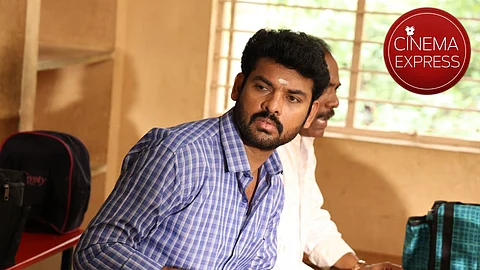

Paramasivan Fathima has been creating ripples ever since it hit the screens on Friday. The controversy began right from the time the teaser was released, and a few controversial dialogues and scenes were billed to have the potential to disturb the communal fabric of Tamil Nadu. The film's director Esakki Karvannan and actor Vemal argue that those claims are far from the truth, and Paramasivan Fathima aims to sow seeds of harmony and not discord.
"Paramasivan Fathima is a feel-good film that has more to offer than two warring villages. There is a story with a noble message, and it marries elements such as romance, sentiment, and even horror. I can guarantee that this will not just be a bland message-heavy film that sermonises," says Vemal. Agreeing to this assessment, Esakki adds that he is a filmmaker who believes it is important to use filmmaking tools to convey a message rather than just being preachy. "I believe that people dislike ones who give advice. Paramasivan Fathima only suggests people live a certain way to lead cordial lives. There won't be an in-your-face messaging."
Barring some big-scale violence such as the Kovai riots and Kanniyakumari Mandaikaadu riots, Tamil Nadu has fared relatively better on the communal front. Esakki is confident that the film will still resonate with people. "As you mentioned, there have been only a few communal riots in our State. But do you think people don't carry communal sentiments in them? By communal sentiments, I do not mean professing a particular faith. It is being too obsessed with one's faith to the point of harming others solely because they belong to another faith. The only difference, back in the day, people used to wield arms, physically attack, and commit arson, but today people spew venom on social media. They wish for too many bad things to happen to others. If they had the power to do such things, they would. Now that they cannot execute such things, they view social media platforms as an outlet to express their perverse intentions. I view evil thoughts as much of a problem as evil deeds. So though there aren't ostensible communal tensions prevailing in Tamil Nadu, Paramasivan Fathima has an important and noble purpose to serve," he explains.
Vemal's last year releases Pogumidam Vegu Thooramillai and SIR too appealed for unity by discarding differences and adopting a rational outlook on life. Paramasivan Fathima seems like the latest addition to the list, but Vemal says he hasn't taken any radical change in listening to scripts or restricting himself to films loaded with social messages. "I listen to scripts that are either emotionally or cerebrally appealing. If a script does not appeal to me in either way, I don't take it. Pogumidam Vegu Thooramillai, SIR and Paramasivan Fathima had a socially pertinent point to make. Next, I will be seen in Desingu Raja 2, which will stay true to its predecessor. So I want to work in all kinds of scripts, be it a social drama, comedy, or horror. Also, I see to it that my films do not offend any particular section and stir discord. Paramasivan Fathima will promote harmony, without hurting anybody's sentiments," he remarks.
Vemal has been balancing OTT projects and films for some time now, and he strongly believes in his ability to seamlessly shift between the sets of a web series and a film without changing his process and preparation. "The only thing that differs between a web series and a film is that twist or a suspenseful moment at the end of an episode, and the absence of the same in a film. Otherwise, I don't think there is something extra I need to be armed with for a web series. I listen to story narrations just the same way. Even if you take my films in recent times, you just need to write one more scene every thirty minutes to get a web series-like effect. Another thing is that shooting a web series takes a longer period and necessitates more of my presence. Other than that, it is just another way of storytelling," he feels.
Esakki Karvannan says Paramasivan is a sensible everyman, and that's what defines his character in the film. "Paramasivan is the representation of every Indian who wants to live a life free of hatred, treating everyone like his own. I would like to reiterate that the communal angle is just one part of the film, which has undercurrents of unity throughout. Paramasivan Fathima was initially denied a Censor certificate, but we obtained it after seeking a review and explaining our noble intentions," he signs off.